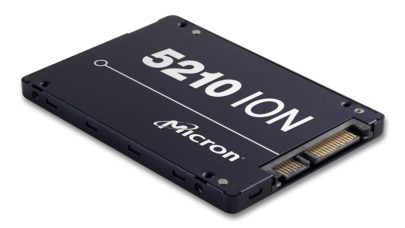
Micron Launches PCIe4 SSDs for the Datacenter
October 6, 2021
Micron today introduced its 7400 series solid state drives (SSDs), a new family of fourth-generation PCIe-based NVMe devices that should give datacenter operato Read more…

Micron Quits 3D XPoint, Puts Factory Up for Sale
March 16, 2021
After almost 10 years of investments and flagging progress, Micron announced today (Tuesday) that it is ending its involvement in 3D XPoint, the non-volatile me Read more…

Micron Boosts Flash Density with 176-Layer 3D NAND
November 10, 2020
The high-density 3D NAND flash memory unveiled by Micron Technology this week promises to boost storage application performance from the datacenter to the edge, Read more…

With Optane Gaining, Intel Exits NAND Flash
October 21, 2020
In a sign that its 3D XPoint memory technology is gaining traction, Intel Corp. is departing the NAND flash memory and storage market with the sale of its manuf Read more…

Micron Accelerator Bumps Up Memory Bandwidth
February 26, 2020
Deep learning accelerators based on chip architectures coupled with high-bandwidth memory are emerging to enable near real-time processing of machine learning a Read more…

Micron Delivers 3D XPoint Drive, Acquires FPGA Device Maker
October 25, 2019
Micron Technology unveiled the X100, a new solid-state drive based on 3D XPoint technology that the company claims is the fastest in the world. It introduced tw Read more…

Intel, Micron Debut Quad-Level Cell NAND Flash
May 22, 2018
Chipmakers continue to gear designs toward AI and other demanding cloud workloads that take advantage of datacenter flash storage capacity. To that end, memory Read more…

Intel, Micron to Go Their Separate 3D NAND Ways
January 10, 2018
The announcement on Monday (Jan. 8) that Intel and Micron have decided to “update” – that is, end – their long-term joint development partnership for 3D Read more…

- Click Here for More Headlines

Whitepaper
Why IT Must Have an Influential Role in Strategic Decisions About Sustainability
In this era, expansion in digital infrastructure capacity is inevitable. Parallel to this, climate change consciousness is also rising, making sustainability a mandatory part of the organization’s functioning. As computing workloads such as AI and HPC continue to surge, so does the energy consumption, posing environmental woes. IT departments within organizations have a crucial role in combating this challenge. They can significantly drive sustainable practices by influencing newer technologies and process adoption that aid in mitigating the effects of climate change.
While buying more sustainable IT solutions is an option, partnering with IT solutions providers, such and Lenovo and Intel, who are committed to sustainability and aiding customers in executing sustainability strategies is likely to be more impactful.
Learn how Lenovo and Intel, through their partnership, are strongly positioned to address this need with their innovations driving energy efficiency and environmental stewardship.
Download Now
Sponsored by Lenovo
Whitepaper
How Direct Liquid Cooling Improves Data Center Energy Efficiency
Data centers are experiencing increasing power consumption, space constraints and cooling demands due to the unprecedented computing power required by today’s chips and servers. HVAC cooling systems consume approximately 40% of a data center’s electricity. These systems traditionally use air conditioning, air handling and fans to cool the data center facility and IT equipment, ultimately resulting in high energy consumption and high carbon emissions. Data centers are moving to direct liquid cooled (DLC) systems to improve cooling efficiency thus lowering their PUE, operating expenses (OPEX) and carbon footprint.
This paper describes how CoolIT Systems (CoolIT) meets the need for improved energy efficiency in data centers and includes case studies that show how CoolIT’s DLC solutions improve energy efficiency, increase rack density, lower OPEX, and enable sustainability programs. CoolIT is the global market and innovation leader in scalable DLC solutions for the world’s most demanding computing environments. CoolIT’s end-to-end solutions meet the rising demand in cooling and the rising demand for energy efficiency.
Download Now
Sponsored by CoolIT
Advanced Scale Career Development & Workforce Enhancement Center
Featured Advanced Scale Jobs:
HPCwire Resource Library
HPCwire Product Showcase
© 2024 HPCwire. All Rights Reserved. A Tabor Communications Publication
HPCwire is a registered trademark of Tabor Communications, Inc. Use of this site is governed by our Terms of Use and Privacy Policy.
Reproduction in whole or in part in any form or medium without express written permission of Tabor Communications, Inc. is prohibited.

























